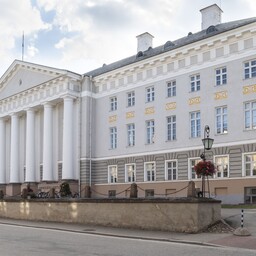Tartu Ülikool plaanib vähendada ingliskeelse arstiõppe kohti. Seni võeti vastu 24 inglise keeles õppivat tudengit. Edaspidi võib neid olla seitse vähem. Ülikool tahab järgmisest õppeaastast võtta juurde 20 eestikeelset kohta. See aitab
vähendada arstide puudust
.
vähendada arstide puudust
Tõlge fraasile: vähendada arstide puudust
EN
reduce the shortage of doctors
Ülikooli dekaan Külli Kingo ütleb: "Me tahame
suurendada arstiteaduse õppekohti
. Me teame, et
aastaks 2033 vajame 1250 uut arsti
. Hetkel on meil 186 õppekohta. Iga aasta peame õpetama 14 arsti rohkem, et see vajadus täita."
suurendada arstiteaduse õppekohti
Tõlge fraasile: suurendada arstiteaduse õppekohti
EN
increase the number of medical study places
aastaks 2033 vajame 1250 uut arsti
Tõlge fraasile: aastaks 2033 vajame 1250 uut arsti
EN
by 2033 we need 1250 new doctors
Viimase kahe aasta jooksul on ülikool ise loonud juurde õppekohti. 2023. aastal alustas arstiõpinguid 180 tudengit, sel aastal 187. Joel Starkopf, ülikooli kliinikumi juhatuse liige, ütleb: "Kümne aasta pärast on meil 10% vähem arste. See on fakt, mitte ennustus.
200 esmakursuslast vastu võtmine
oleks optimaalne miinimum, mida me saame teha."
200 esmakursuslast vastu võtmine
Tõlge fraasile: 200 esmakursuslast vastu võtmine
EN
admitting 200 first-year students
Kui
väheneb välistudengite arv
, langeb ka õppemaksust saadav tulu.
20 lisaõppekoha loomine
maksaks 500 000 kuni 700 000 eurot. Haridus- ja teadusministeerium ütleb, et
lisaraha leidmine on prioriteetne
. Seda arutatakse ülikoolidega.
väheneb välistudengite arv
Tõlge fraasile: väheneb välistudengite arv
EN
the number of foreign students decreases
20 lisaõppekoha loomine
Tõlge fraasile: 20 lisaõppekoha loomine
EN
creation of 20 additional study places
lisaraha leidmine on prioriteetne
Tõlge fraasile: lisaraha leidmine on prioriteetne
EN
finding additional funding is a priority
The University of Tartu plans to reduce the number of English-language medical study places. So far, 24 students studying in English have been admitted. In the future, there could be seven fewer. The university wants to add 20 Estonian-language places starting from the next academic year. This will help reduce the shortage of doctors.
University Dean Külli Kingo says: "We want to increase the number of medical study places. We know that by 2033, we will need 1,250 new doctors. Currently, we have 186 study places. Every year, we need to train 14 more doctors to meet this demand."
Over the past two years, the university has itself created additional study places. In 2023, 180 students began medical studies, and this year, 187. Joel Starkopf, a member of the university hospital's board, says: "In ten years, we will have 10% fewer doctors. This is a fact, not a prediction. Admitting 200 first-year students would be the optimal minimum we can do."
If the number of international students decreases, the income from tuition fees will also decline. Creating 20 additional study places would cost 500,000 to 700,000 euros. The Ministry of Education and Research says that finding additional funding is a priority. This is being discussed with the universities.

